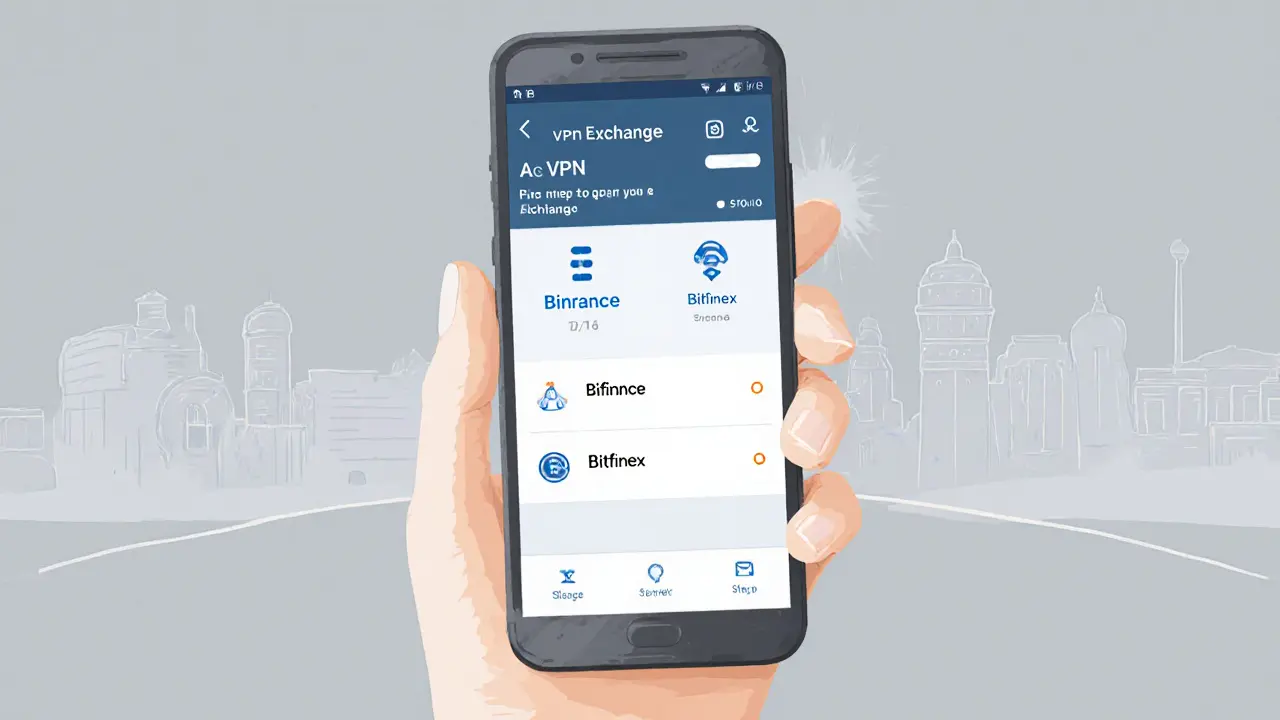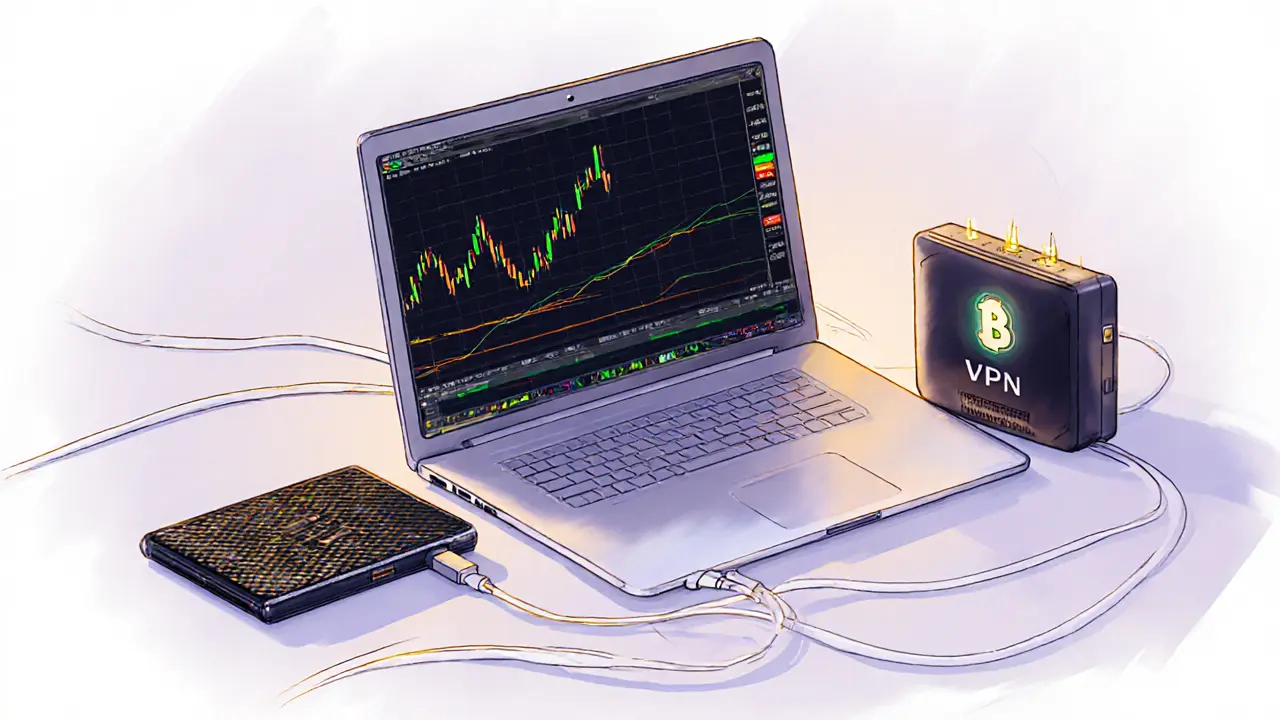Bangladesh Crypto Trading VPN Selector
Select your preferences and click "Find Best VPN for My Needs" to get personalized recommendations.
Trading crypto from Bangladesh can feel like a maze of blocked sites, government monitoring, and laggy connections. The short answer? A reliable Bangladesh crypto VPN lets you bypass geo‑restrictions, hide your real IP, and keep the Digital Security Act from spying on every click. Below we walk through why a VPN matters, which services work best, how to set one up, and what to do when things go sideways.
Why Bangladeshi Traders Need a VPN
In 2018 Bangladesh passed the Digital Security Act a law that gives authorities broad powers to monitor online activity and intercept digital communications. While the act aims to curb cybercrime, it also means any unencrypted traffic can be inspected. For crypto traders, that risk translates into two real problems:
- Exchange platforms like Bitfinex and, at times, Binance outright block IP addresses from Bangladesh, making login impossible.
- Even if an exchange isn’t blocked, malicious actors could sniff your connection, steal login credentials, or link a Bitcoin address to your real‑world identity.
A VPN encrypts your traffic with AES‑256 encryption, routes it through a server in a country where the exchange is allowed, and masks your true IP address. The result is two‑fold: you can reach the exchange and you stay hidden from prying eyes.
What to Look for in a VPN for Crypto Trading
Not every VPN is built for high‑frequency trading or the heavy surveillance environment in Bangladesh. Here are the non‑negotiable features:
- Strong Encryption: AES‑256 is the industry baseline. Look for providers that also support WireGuard a modern tunneling protocol that offers faster speeds and robust security.
- Server Coverage: You need servers in countries where the target exchange operates freely-typically the U.S., Japan, or European hubs. Proximity matters for latency.
- Speed & Low Latency: Real‑time price feeds demand fast connections. Providers that advertise “no‑logs” and “RAM‑only servers” usually deliver better performance.
- Crypto‑Friendly Payment: Paying with Bitcoin or other coins secures your anonymity further. Some VPNs accept crypto via CoinGate.
- Additional Security Tools: Built‑in malware protection, phishing link blocking, and dark‑web monitoring add layers of safety for traders.
Top Three VPNs for Bangladeshi Crypto Traders
| VPN | Key Crypto Features | Servers (Countries) | Encryption / Protocols | Pricing (Monthly) |
|---|---|---|---|---|
| ExpressVPN | RAM‑only servers, private DNS, 30‑day money‑back for first‑time users | 94 | AES‑256, WireGuard, OpenVPN | $12.95 |
| Surfshark | Unlimited devices, Bangladesh IP pool, 30‑day money‑back | 100+ | AES‑256, WireGuard, IKEv2 | $9.99 |
| NordVPN | Phishing protection, dark‑web scan, crypto payments via CoinGate | 118 | AES‑256, NordLynx (WireGuard‑based), OpenVPN | $11.99 |
All three meet the baseline security checklist, but each shines in a different area. ExpressVPN is the most balanced for speed and privacy, Surfshark gives the widest Bangladeshi IP pool, and NordVPN adds the most crypto‑specific safeguards.

Step‑by‑Step: Setting Up a VPN for Crypto Exchanges
- Choose a Provider: Pick one that matches your priority-speed (ExpressVPN), local IP pool (Surfshark), or extra security (NordVPN).
- Create an Account: Sign up using an email that doesn’t link to your personal identity. If you want maximum anonymity, pay with Bitcoin via CoinGate whenever the option is available.
- Download the App: Get the official client from the provider’s website or trusted app store. Install it on every device you plan to trade from (PC, smartphone, tablet).
- Connect to the Right Server: For Binance, select a server in the United States or Japan. For Bitfinex, a European server (e.g., Germany or the Netherlands) usually works best. Test a few to see which gives the lowest ping.
- Verify Your New IP: Visit whatismyip.com to confirm the displayed location matches the server you chose.
- Log Into the Exchange: Open the exchange website or app. You should now bypass the geo‑block and see the standard login screen.
- Enable Two‑Factor Authentication (2FA): Even though the VPN hides your traffic, 2FA adds an extra barrier against account takeover.
- Clear Cache If Needed: If the site still shows a block, clear browser cookies and cache, then reconnect to a different server.
That’s it-once the VPN is active, your traffic looks like it’s coming from the chosen country, and the exchange treats you like any other user.
Troubleshooting Common Issues
Even the best VPN can hit hiccups. Here’s a quick cheat‑sheet:
- Connection Drops: Switch to a server closer to the exchange’s data center. For Binance, try a U.S. West Coast node.
- Exchange Still Blocks You: Some platforms detect VPN IP ranges. In that case, toggle the “obfuscated servers” setting (available in NordVPN and ExpressVPN) which masks the VPN traffic signature.
- Slow Prices Updates: Check your VPN’s speed test. If latency is high, change the protocol to WireGuard for faster routing.
- Login Errors: Clear cookies, ensure you’re not using a cached session, and verify the VPN is fully connected (green lock icon).
If problems persist, reach out to the VPN’s 24/7 live chat-most providers offer rapid assistance for crypto‑related issues.
Staying Safe Beyond the VPN
A VPN is only one layer of protection. Combine it with these habits:
- Use a hardware wallet for long‑term storage; keep private keys offline.
- Never reuse passwords across exchanges. A password manager helps keep them unique.
- Enable 2FA with an authenticator app, not SMS, to avoid SIM‑swap attacks.
- Regularly scan your device with anti‑malware tools; some VPNs (NordVPN) bundle this feature.
- Keep your operating system and trading apps up to date; patches often fix security holes.
By stacking these defenses, you reduce the chance that a breach on one front exposes your entire crypto portfolio.
Future Outlook: VPNs and Crypto in Bangladesh
The cat‑and‑mouse game between exchanges and VPNs isn’t slowing down. As Bangladesh tightens digital surveillance, VPN providers are adding more obfuscation techniques and expanding server networks. Conversely, exchanges are improving IP‑fingerprinting to block “fake” locations. Traders who stay informed about both regulatory updates and VPN feature releases will maintain the edge.
In practice, that means subscribing to newsletters from trusted VPN blogs, watching for announcements about new server regions, and periodically testing alternative providers. The market is also seeing more crypto‑centric VPN plans that accept Bitcoin directly and market themselves as “trader‑ready”. Keeping an eye on these niche offerings can save you money and improve performance.

Frequently Asked Questions
Is using a VPN legal in Bangladesh?
Yes, VPNs are not banned, but the Digital Security Act gives authorities the power to request user data. Choosing a no‑logs VPN with RAM‑only servers minimizes any legal exposure.
Can I pay for a VPN with cryptocurrency?
Most top providers-ExpressVPN, Surfshark, and NordVPN-accept Bitcoin or other coins via payment partners like CoinGate, which adds an extra privacy layer.
Which server location works best for Binance?
Binance freely serves the United States, Japan, and most European nations. Connecting to a U.S. (Virginia or California) or Japanese server usually yields the fastest, uninterrupted access.
What if the exchange still blocks my IP after using a VPN?
Try an obfuscated or “stealth” server option, clear your browser cache, or switch to a different country’s server. If all else fails, contact the VPN’s support-many have dedicated crypto‑trading troubleshoot guides.
Do I need a separate VPN for each device?
A single subscription usually covers multiple devices. For example, NordVPN allows unlimited simultaneous connections, so you can protect your PC, phone, and tablet with one account.

